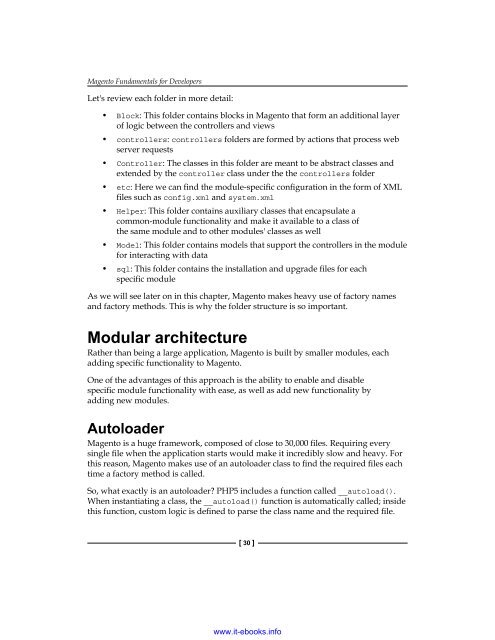www.it-ebooks.info
Create successful ePaper yourself
Turn your PDF publications into a flip-book with our unique Google optimized e-Paper software.
Magento Fundamentals for Developers<br />
Let's review each folder in more detail:<br />
• Block: This folder contains blocks in Magento that form an add<strong>it</strong>ional layer<br />
of logic between the controllers and views<br />
• controllers: controllers folders are formed by actions that process web<br />
server requests<br />
• Controller: The classes in this folder are meant to be abstract classes and<br />
extended by the controller class under the the controllers folder<br />
• etc: Here we can find the module-specific configuration in the form of XML<br />
files such as config.xml and system.xml<br />
• Helper: This folder contains auxiliary classes that encapsulate a<br />
common-module functional<strong>it</strong>y and make <strong>it</strong> available to a class of<br />
the same module and to other modules' classes as well<br />
• Model: This folder contains models that support the controllers in the module<br />
for interacting w<strong>it</strong>h data<br />
• sql: This folder contains the installation and upgrade files for each<br />
specific module<br />
As we will see later on in this chapter, Magento makes heavy use of factory names<br />
and factory methods. This is why the folder structure is so important.<br />
Modular arch<strong>it</strong>ecture<br />
Rather than being a large application, Magento is built by smaller modules, each<br />
adding specific functional<strong>it</strong>y to Magento.<br />
One of the advantages of this approach is the abil<strong>it</strong>y to enable and disable<br />
specific module functional<strong>it</strong>y w<strong>it</strong>h ease, as well as add new functional<strong>it</strong>y by<br />
adding new modules.<br />
Autoloader<br />
Magento is a huge framework, composed of close to 30,000 files. Requiring every<br />
single file when the application starts would make <strong>it</strong> incredibly slow and heavy. For<br />
this reason, Magento makes use of an autoloader class to find the required files each<br />
time a factory method is called.<br />
So, what exactly is an autoloader? PHP5 includes a function called __autoload().<br />
When instantiating a class, the __autoload() function is automatically called; inside<br />
this function, custom logic is defined to parse the class name and the required file.<br />
[ 30 ]<br />
<strong>www</strong>.<strong>it</strong>-<strong>ebooks</strong>.<strong>info</strong>



